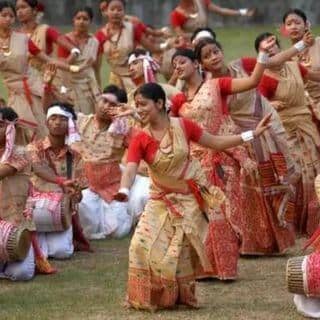The Bihu festival is the most important cultural festival of Assam, celebrated with great joy and enthusiasm by people of all ages and communities. The festival is marked by colorful festivities, music, dance, and traditional food. It is celebrated thrice a year: Rongali Bihu in April, Kongali Bihu in October, and Bhogali Bihu in January.
Rongali Bihu Festival
First, Rongali Bihu, also known as Bohag Bihu, marks the beginning of the Assamese New Year and is celebrated in April. It is a time of renewal, hope, and joy, and is marked by the planting of new crops and the harvesting of winter crops. Again, the festival is celebrated with traditional music and dance, including the Bihu dance, which is a joyous and energetic dance performed by a group of people in colorful Assamese attire.
Kongali Bihu Festival
Second, Kongali Bihu, also known as Kati Bihu, is celebrated in October and marks the end of the cropping season. It is a time of reflection, prayer, and gratitude, and is celebrated with traditional rituals and prayers. During this festival, people light earthen lamps in their homes to ward off evil spirits and offer prayers for good health and prosperity.
Bhogali Bihu Festival
Third, Bhogali Bihu, also known as Magh Bihu, is celebrated in January and marks the end of the harvesting season. It is a time of feasting, merriment, and community celebrations. People build bonfires, sing traditional songs, and cook traditional dishes. The dishes like pitha, laru, and doi chira, made from rice, coconut, jaggery, and curd.
Conclusion
In conclusion, the Bihu is a celebration of the spirit of Assam and its rich cultural heritage. It is a time of joy, merriment, and reflection, and is marked by traditional rituals, music, dance, and food.
Moreover, the festival is an important part of the Assamese identity. Again, is celebrated with great fervor and enthusiasm by people of all ages and communities.
